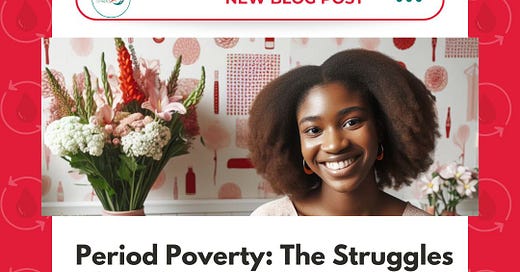Asmau, a 15-year-old girl in Northern Nigeria, faces challenges every time she has her period. She often resorts to using pieces of cloth cut from old fabric by her mother. Due to the fear of staining her school uniform and the stigma surrounding menstruation, she misses six days of school each month. This experience has negatively impacted her studies and participation in extracurricular activities in school. This is the harsh reality that Asmau and thousands of young girls in Northern Nigeria have to endure.
In a country as diverse and vibrant as Nigeria, it's easy to overlook the silent struggles faced by many adolescent girls. Among these challenges is period poverty, a harsh reality that often goes unnoticed. Period poverty refers to the lack of access to menstrual hygiene products, proper sanitation facilities, and menstrual education, leading to significant health and social implications. In Nigeria, this issue is particularly acute, affecting millions of young girls across the nation.
Nigeria, despite its economic growth and urban development, still grapples with widespread poverty and inadequate healthcare infrastructure. These factors exacerbate the issue of period poverty, especially for adolescent girls from low-income households. According to a UNICEF report, approximately 60% of Nigerian girls cannot afford sanitary pads, leading them to resort to unhygienic alternatives like old rags, leaves, or even newspapers. This not only exposes them to health risks but also contributes to feelings of shame and embarrassment.
The consequences of period poverty extend far beyond physical discomfort. For many young girls, it hampers their ability to attend school regularly. Missing school days due to menstruation not only affects their academic performance but also perpetuates a cycle of inequality. Moreover, the lack of access to menstrual hygiene products can lead to reproductive tract infections and other health complications, further marginalising these vulnerable individuals.
One of the most significant barriers to addressing period poverty in Nigeria is the pervasive stigma surrounding menstruation. Cultural taboos and myths contribute to the silence and shame associated with periods, making it difficult for girls to seek support or information. Breaking this silence requires comprehensive menstrual education programs that challenge stereotypes and promote menstrual health as a fundamental human right.
Period poverty is not just a matter of hygiene; it's a matter of human rights and dignity. Addressing this issue requires a multifaceted approach that combines access to menstrual products, comprehensive education, and cultural sensitivity. By breaking the silence and working together, we can ensure that every adolescent girl in Nigeria has the support and resources she needs to manage her period with confidence and dignity. It's time to make period poverty a thing of the past.
Learn More About How We Are Solving Period Poverty HERE




